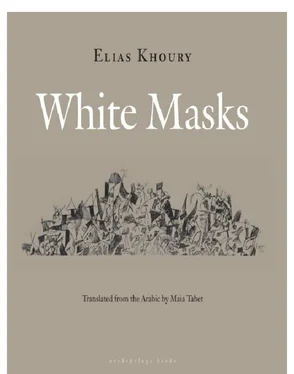“I want to sleep, leave me now,” he said.
So I did, but the door remained open all that day and all night. I didn’t dare sleep by his side, I was afraid, no, not of him, but… oh! I don’t know, I was just afraid. . But I thanked God that the djinn had departed and Khalil was himself again.
In the morning, my husband got up, dressed, and said he was going to work. I can’t describe to you how happy I was. But then he switched on the radio and sat in the living room.
“What about work?” I asked.
“I’m just going to listen to the news before I go,” he replied.
I rushed over to Sitt Khadijah. I told her the whole story and kissed both her hands. Khalil’s cured, I told her, and asked if there was anything else I should do. She advised me to burn incense in the room. She gave me some — only after I’d paid a pretty penny for it, mind you — and I went back home.
When I got there, I found him in the room, sitting on the edge of the bed, staring into space. . I spoke to him, but he didn’t even turn around. . so I started on the incantations and the incense-burning. His face was furrowed with wrinkles, and he seemed totally absent. Oh Lord, Lord, what is going on, what is happening to us, I said to myself… his face. . that’s not a face… so thin and wrinkled, and with those big dark rings under his eyes. He gestured for me to leave the room, so I did, and I heard the key turn in the lock.
He went back to his old ways, and nothing did any good anymore. To tell the truth, I’m not one to believe in djinns and demons, this cat business was all stuff and nonsense, as far as I could tell, sheer superstition, just a ploy to make people part with their money! Still, what is it, I thought, what is he doing to himself acting like that, I really didn’t understand. . and what made it worse was that I didn’t know what I could do to help him. Honestly, it’s wretched being a woman, putting up with a man’s every whim! I couldn’t go on like this much longer, with no one to turn to — it’s as if there weren’t a soul in the city left! Where were my neighbors! Where was everybody? Why had they left me all alone with a sick man and just abandoned me?
What can I tell you, we’d become a story, a mirror. We’d become. . Oh, Lord, I thought, preserve us from prying eyes. . People looked at me and recoiled, as if I had the plague. It was all Khadijah’s fault, she was the one who spread rumors about the djinn, and no one would come to visit us anymore.
And him?
Well, he lied when he said he was going to work. I’m telling you, before my very eyes, he stood there and told a barefaced lie: he didn’t go to work at all. He went somewhere and bought these useless things, these erasers. . All sorts of erasers, little ones and big ones, yellow ones and white ones and gray ones. There were erasers everywhere. . what for? I found them scattered around his bed one day, and when he came into the bedroom and saw me looking them over, he swept them all up and cradled them in his arms like you would an infant, shaking his head back and forth. He leaned down to pick up some erasers that had dropped to the ground, and dropped a few more; I bent down to help him, and then when he had them all securely in his grip, he laughed, and these great big yellowed teeth filled his face — it was the first time I noticed that he had such large teeth — and I felt afraid all of a sudden. He could attack me, I thought. Imagine, feeling afraid of my own husband, after a lifetime spent together. . but, there it is, I was afraid.
“Khalil, what are all these for?” I asked. “Please answer me, and let’s be done with all this.”
But answer me he wouldn’t. . He just laughed. . No eating that day, no leaving the room, just laughing. . My goodness, even his teeth laughed!
He stopped locking the door — so I could go in whenever I felt like it — and started doing these strange things: he’d take an eraser and pull it hard over the skin of his hand, as if he were trying to erase something written there. He just muttered at me when I asked what he was doing, he’d taken to muttering constantly. Sometimes he played with the erasers: he’d line them up along one side of the bed, or gather them all together and hurl them against the wall.
Then I discovered that this eraser business wasn’t a joke, it was serious. I found him one day working on the newspaper cuttings about Ahmad. Naturally, like any other family, we’d kept all the news reports about our dead son and put them in a big manila envelope — we never looked at them, though, just kept them as mementos. He had pulled out the envelope and, seated on the floor, spread all the clippings around him. He erased tirelessly.
“What are you doing?” I asked him.
“Working,” he answered, looking up.
Not another word. Just “working”…
He worked, let’s call it that, all day long. I couldn’t bear to be in the same room with him anymore, I was really fed up, and I just let him be. Initially, I had tried to steal the cuttings away from him, but that had driven him wild, and he’d thrown himself over them on the ground and refused to move. I could always go out and buy another lot, so I relented.
Erasing, that’s what he did: at first, it was just the pictures, photos of Ahmad. He’d start with the eyes, go down to the chin, and then work his way up to the nose — even when the paper tore, he just carried on. All day long, he worked feverishly, constantly muttering, as if possessed, or something…
I didn’t tell anybody. I certainly wasn’t going back to Khadijah, and he flatly refused to see the doctor. At least he was eating now, even if it was only once a day; and I could visit with him whenever I wanted.
Then he began erasing the newsprint. He’d rub out Ahmad’s name: first the surname, Jaber, then the word Khalil, then Ahmad, then the word martyr, and then everything written about him.
All day long, he erased, and then at night, I guess he was having trouble sleeping because he’d sit up in bed absolutely still. He didn’t turn on the lights, but he wasn’t asleep either — he just sat up against the headboard, eyes wide open.
Once he was done with the newspaper cuttings, he moved on to the posters. He had stashed away about ten of them in the wardrobe, after he had stopped pasting them up all over the neighborhood following the rejection of his request for reprints from the local party cadre. There was just the one hanging on our bedroom wall, and he never again brought up the subject of the posters.
Now the posters were scattered all over the room, and he was kneeling over them on the floor. When I asked him what he was doing, it wasn’t so much a question as a hysterical outburst. “I’m working, this is work,” he said. His “work” consisted of erasing the blown-up images of Ahmad’s face: first the eyes, then the chin, and then, when nothing but gray was left and the paper started to tear from all the rubbing, he moved on to the print. I lost my temper.
“You can’t do that,” I shouted. “He’s our son, you brute! First they killed him and now you want to wipe him off the face of the earth!”
I don’t know what got into me, but I was screaming like a madwoman. He stared at me vacantly, as if he hadn’t heard anything, and went back to what he was doing: muttering and “disappearing” the words methodically, holding the poster down with one hand, rubbing with the eraser, and then softly blowing away the debris. Seeing him like this — looking up at me, eyes dilated, still blowing at the paper — just made me angrier, and all of a sudden, I found myself hitting him. As I pummeled his head and face he stood completely still, but when I grabbed the posters and tried to wrench them from him, that’s when he began shouting at me to get out of there.
Читать дальше












